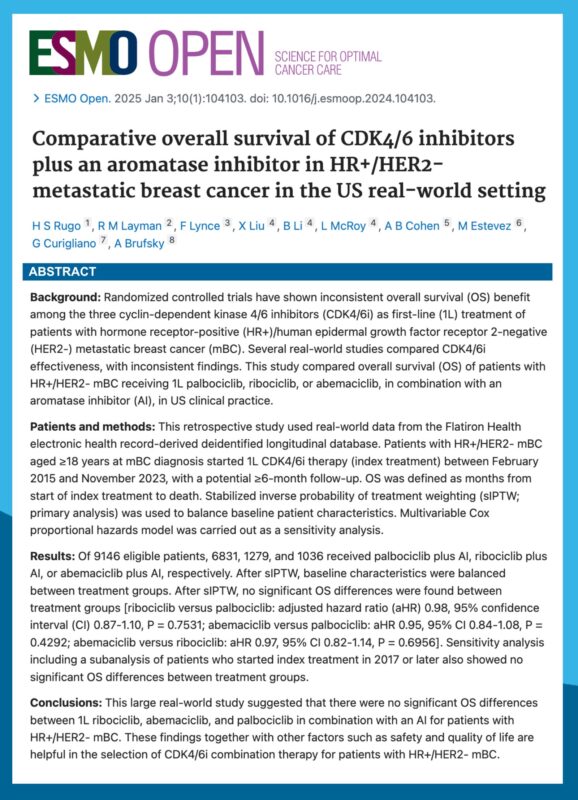Dana-Fraber’s Breast Oncology Center shared an article on X recently published on ESMO Open authored by Hope Rugo and colleagues:
“New in ESMO Open: Comparative overall survival of CDK4/6 inhibitors plus an aromatase inhibitor in HR+/HER2- Metastatic Breast Cancer in the US real-world setting.”
Authors: Hope S. Rugo et al.

In this article, Hope Rugo and colleagues found that there were no significant differences in overall survival (OS) among the three cyclin-dependent kinase 4/6 inhibitors (CDK4/6i) – palbociclib, ribociclib, and abemaciclib – when used in combination with an aromatase inhibitor (AI) as first-line (1L) treatment for patients with HR+/HER- metastatic breast cancer (mBC).
The study analyzed real-world data from the Flatiron Health electronic health record-derived database, identifying 9,146 eligible patients who started 1L CDK4/6 inhibitor treatment between February 2015 and November 2023.
Among them:
- 6,831 received palbociclib plus AI
- 1,279 received ribociclib plus AI
- 1,036 received abemaciclib plus AI
To ensure a fair comparison, the researchers used stabilized inverse probability of treatment weighting (sIPTW) to balance baseline characteristics across treatment groups. The study demonstrated that after sIPTW adjustment, there were no significant OS differences between the three treatment groups.
The adjusted hazard ratios (aHR) with 95% confidence intervals (CI) were as follows:
– ribociclib versus palbociclib (aHR 0.98, 95% CI 0.87-1.10, P = 0.7531),
– abemaciclib versus palbociclib (aHR 0.95, 95% CI 0.84-1.08, P = 0.4292),
– abemaciclib versus ribociclib (aHR 0.97, 95% CI 0.82-1.14, P = 0.6956).
Sensitivity analyses, including a subanalysis of patients who started treatment in 2017 or later, confirmed these findings, showing no significant differences in OS between treatment groups.
Given these results, the choice of CDK4/6 inhibitor in clinical practice may depend on other important factors, such as safety, side effect profiles, and impact on quality of life. These findings provide valuable guidance for oncologists selecting the most appropriate treatment for patients with HR+/HER2− mBC.
